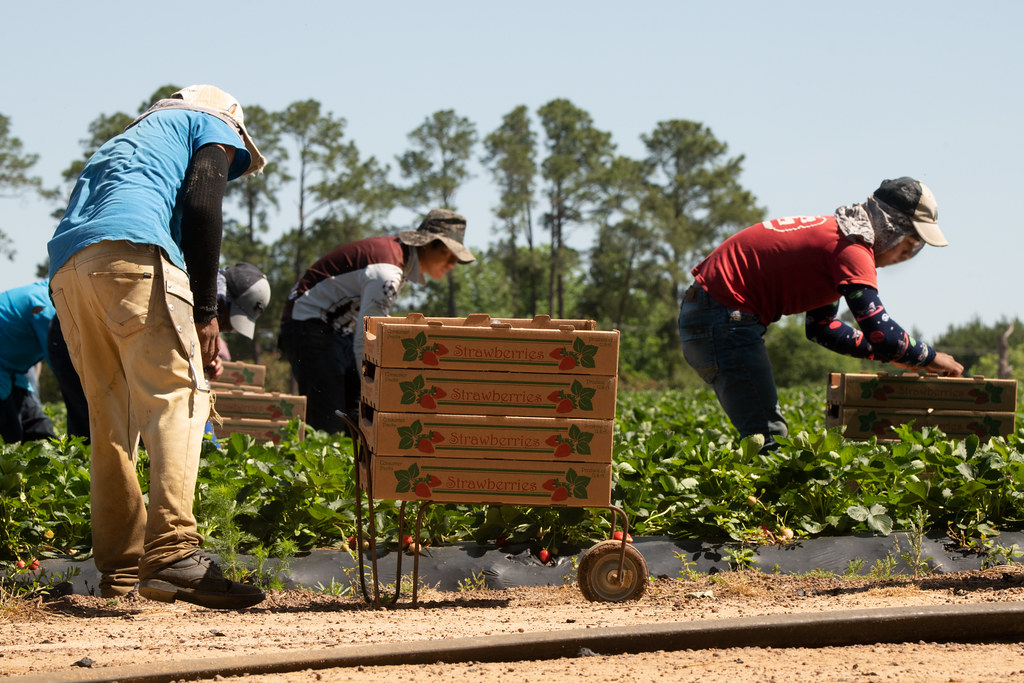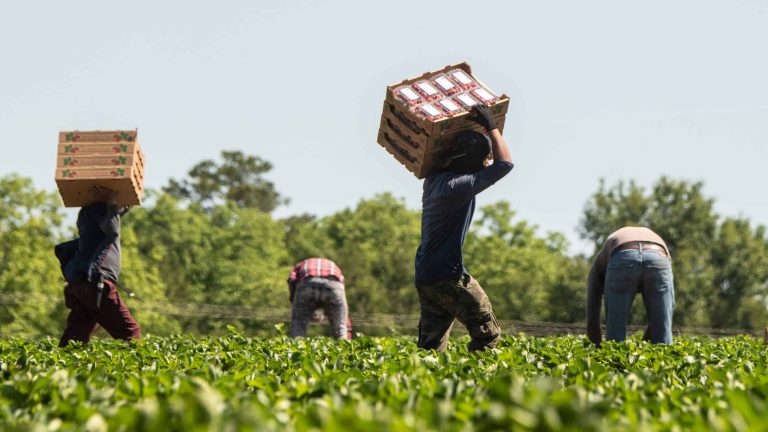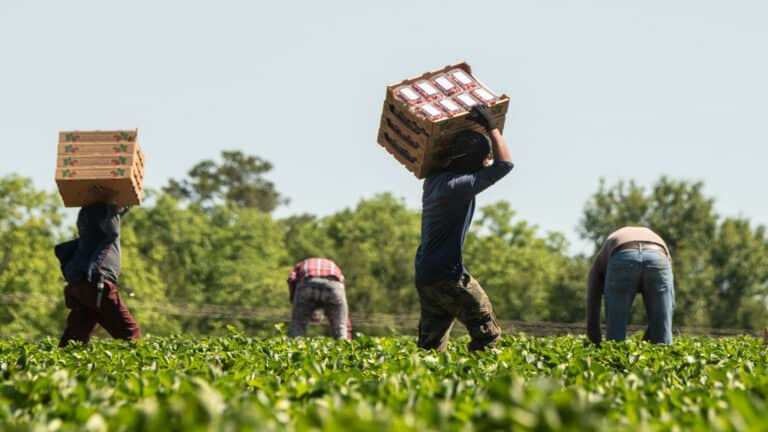
Meredith Gudesblatt is a student at Harvard Law School and a member of the Labor and Employment Lab.
In 2008, Alfredo Conovilca traveled to Colorado to herd sheep on an H-2A visa. On paper, it looked promising: the employer would cover everything from transportation to housing and food. But Conovilca soon discovered there were hidden costs. When he fell ill with back pain—precipitated by kidney issues resulting from insufficient access to water—his employer refused to take him to the hospital, forcing his family in Peru to purchase and send him medicine.
Migrant workers that reside in employer-owned housing are some of the most isolated, vulnerable, and exploited laborers. Unsurprisingly, countless iterations of Conovilca’s story have cropped up over the years. These workers need access to medical, legal, and social services, yet there is no federal law that guarantees access rights. Employers control and regularly deny migrants’ ability to leave the work site; they also block outside providers from serving migrants in need, even at their homes during non-working hours.
The Colorado Farmworker Bill of Rights’ (“CFBOR”) access provisions, which guarantee the right to receive visitors and key services, seek to challenge this unequal power dynamic. But these provisions are under threat, and their survival depends on both local politics and how expansive Cedar Point Nursery v. Hassid (2021) really is.
Colorado’s Farmworker Bill of Rights
On June 25, 2021, Colorado governor Jared Polis signed Senate Bill 21-087 into law. Penned in response to racial disparities in COVID rates among agricultural workers, the CFBOR attempts to rectify the racist exclusion of farmworkers from the NLRA and FLSA. It grants protections such as the right to unionize, earn minimum wage, and qualify for overtime pay.
The specific provision being challenged is Section 8-13.5-202, which establishes a right of access to service providers including health care, education, and legal providers, government officials, clergy, and “other service provider[s] to which a farmworker may need access.” To this end, Section 8-13.5-202(1)(a)-(b) prohibits employers from interfering with “reasonable access to visitors at [a worker’s] employer-provided housing” and at any location when the worker is “not performing compensable work or during paid or unpaid rest and meal breaks.” It also specifies that health-care providers may visit anytime. However, Section 8-13.5-202(d) allows employers to mandate visitor “protocols designed to manage biohazards and other risks of contamination” related to food safety and livestock-related injuries.
In March 2022, the Colorado Department of Labor and Employment promulgated regulations that emphasize the provisions were meant to ensure “housed employees” could receive “visitors” and access “offsite services required by statute.”
A Quick Recap of Cedar Point
Two days before the CFBOR became law, the Supreme Court decided Cedar Point, which OnLabor has covered extensively. Cedar Point belongs to a long line of decisions pitting the right to unionize against employer property rights; there, a California statute granted union organizers access to an agricultural employer’s property for up to three hours per day, 120 days per year, in order to discuss unionization. The Supreme Court sided with the employer, elevating property rights above workers’ rights: the Court held the regulation grants a third party the “right to invade” the property and thus constitutes a per se physical taking. Without just compensation by the State, union organizers could no longer enter an employer’s property.
A Timeline of Challenges to the Access Provisions
Two days before the CFBOR’s one-year anniversary, agricultural employers filed the Talbott Lawsuit in the District Court for the District of Colorado, challenging the access provisions as takings in violation of the Fifth and Fourteenth Amendments. They argued the provisions were “far more onerous” than those in Cedar Point and “deprive[d] Plaintiffs of the right to exclude.” After Colorado Legal Services and an anonymous farmworker intervened to argue the suit lacked a legal basis, the Plaintiffs filed an unopposed motion to dismiss, which was granted in February 2023.
In June 2023, the Colorado Livestock Association essentially revived the same claim, arguing the provisions violated both the Fifth Amendment and the Colorado Constitution’s Taking Clause. In a motion for judgment on the pleadings, the Polis administration argued that under Cedar Point, if the Plaintiffs succeed, the only viable remedy is financial compensation, not equitable relief amounting to a repeal of the law. The District Court agreed and dismissed the suit for lack of standing in May 2024, but the Plaintiffs appealed and the suit remains pending.
As of February 2025, in what farmworker advocates condemn as an attempt to circumvent ongoing judicial review, Colorado lawmakers have introduced SB-128 to exempt an employer’s property from the access provisions.
Will the Access Provisions Be Repealed in the Legislature?
The CFBOR passed along party lines in the Senate and House, 19-15-1 and 40-24-1, respectively. Democrats still hold a majority in both chambers. However, moderate Democratic politicians co-sponsored the repeal, and backers contend that it will protect migrant workers by requiring ICE agents to get a warrant in order to enter farm property. This seems like a red herring, but the bill continues to move through the House where it faces steeper odds of passing than the Senate.
Court Challenges Hinge on Cedar Point’s Applicability
Cedar Point should be of limited applicability to the CFBOR access provisions for two main reasons: first, Cedar Point is narrowly focused on the issue of union access; second, Cedar Point did not involve workers that lived on employer property.
Unlike in Cedar Point, which focused exclusively on union organizers’ access, the access provisions aim to generate access for a broad set of necessary services for farmworkers during off-hours, and, under certain circumstances, during work hours. The limited scope of Cedar Point makes it a poor fit for determining farmworkers’ access to key services.
Even if the access provisions were limited to unions, Cedar Point should still be inapplicable because, as the Court noted, none of the workers lived on the property. In these circumstances, employers dictate all terms of interactions with and access to their employees. There is already precedent that suggests employers’ property rights may be required to yield when union organizers have no reasonable access to employees outside an employer’s property.
Even outside the union context, other courts have found this distinction meaningful. In State v. Shack (1971), a New Jersey Supreme Court Case that reversed a legal aid attorney’s trespass conviction, the justices stated, “it [is] unthinkable that the farmer-employer can assert a right to isolate the migrant worker in any respect significant for the worker’s well-being.” More importantly, title to real property cannot, and should not, include “dominion over the destiny of persons the owner permits to come upon the premises.” Property rights must yield and not be used to injure the rights of others. There should be a State v. Shack exception to Cedar Point.
Moreover, Cedar Point did not address a relevant longstanding restriction on property rights—entry on property out of public or private necessity. Allowing migrants to meet with medical providers could easily fit within both categories of necessity.
Ultimately, agribusinesses believe they are defending the “reasonable expectation of private property as any other employment entity” would have. But this assertion wrongly ignores that the CFBOR access provisions combat agricultural exceptionalism by defending migrant workers’ right to access basic services that all other workers take for granted and enjoy.









Daily News & Commentary
Start your day with our roundup of the latest labor developments. See all
February 24
In today’s news and commentary, the NLRB uses the Obama-era Browning-Ferris standard, a fired National Park ranger sues the Department of Interior and the National Park Service, the NLRB closes out Amazon’s labor dispute on Staten Island, and OIRA signals changes to the Biden-era independent contractor rule. The NLRB ruled that Browning-Ferris Industries jointly employed […]
February 23
In today’s news and commentary, the Trump administration proposes a rule limiting employment authorization for asylum seekers and Matt Bruenig introduces a new LLM tool analyzing employer rules under Stericycle. Law360 reports that the Trump administration proposed a rule on Friday that would change the employment authorization process for asylum seekers. Under the proposed rule, […]
February 22
A petition for certiorari in Bivens v. Zep, New York nurses end their historic six-week-strike, and Professor Block argues for just cause protections in New York City.
February 20
An analysis of the Board's decisions since regaining a quorum; 5th Circuit dissent criticizes Wright Line, Thryv.
February 19
Union membership increases slightly; Washington farmworker bill fails to make it out of committee; and unions in Argentina are on strike protesting President Milei’s labor reform bill.
February 18
A ruling against forced labor in CO prisons; business coalition lacks standing to challenge captive audience ban; labor unions to participate in rent strike in MN